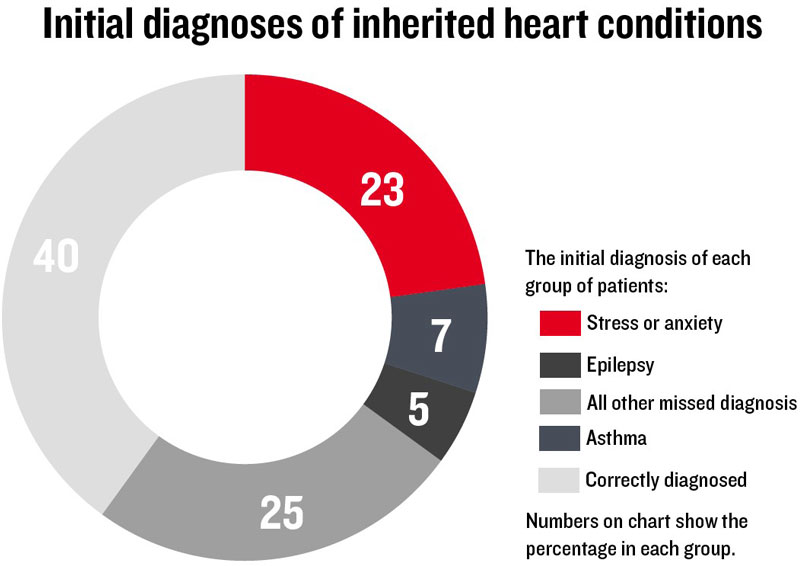Heart Conditions Attributed to Stress & Anxiety
6th July 2017
A survey published this week by the British Heart Foundation (BHF) has found that six in ten patients living with inherited heart conditions face long delays before receiving a diagnosis, as their symptoms are attributed to other conditions like stress, anxiety and epilepsy.
This work shows the need for more research into genetic testing to make diagnosis quicker.

Diagnosing Inherited Heart Conditions
Around 62,000 people in the UK could have the genes which cause deadly inherited heart conditions. Many of these people have not been diagnosed. Diagnosing inherited heart conditions using currently available techniques can be very challenging.
A patient suffering from symptoms like difficulty breathing, palpitations, chest tightness and a racing heart rate could have an inherited heart condition, or they could have a completely unrelated problem.
A survey of patients diagnosed with inherited heart conditions conducted by The BHF found that the majority of patients (60%) had initially been diagnosed with another condition.
This failure to make a diagnosis and start treatment puts patients at an increased risk of sudden cardiac death.

Shannon Donovan
Shannon Donovan was initially diagnosed with epilepsy before discovering she had the condition catecholaminergic polymorphic ventricular tachycardia (CPVT). Her father was also subsequently diagnosed with the condition.
Shannon explained: “When I kept collapsing as a child, doctors first thought I had epilepsy. But after four years, when the treatment failed to work, we discovered that I actually had the inherited heart condition CPVT. It was terrifying to find out that I was at risk of suffering a cardiac arrest. Luckily after I was diagnosed they tested my family and discovered that my father also had the condition. It’s really important that people are aware of the symptoms and any history of heart problems in the family.”
While genetic testing for families at risk can help diagnose some of these conditions, many of the genes responsible remain a mystery. Around one in five (17%) of respondents said that genetic testing helped with their diagnosis compared to seven out of ten (67%) who were eventually diagnosed through an ECG or echocardiogram.
Talking about the survey results, and the need for more research, Dr Mike Knapton, Associate Medical Director at the British Heart Foundation, said: “Inherited heart conditions can be silent killers. This means that early diagnosis is essential so people can be put on the right treatment and live a normal life. These results show that it can be extremely difficult to correctly diagnose people, meaning it’s vital that we raise awareness about the symptoms and diagnostic tests for those most at risk of inherited heart conditions.”
“We urgently need to fund more research to identify the faulty genes responsible for these conditions and find new ways to treat people with inherited heart disease.”Dr Knapton, Associate Medical Director at the British Heart Foundation
Each week in the UK, around 12 seemingly healthy people aged 35 and under are victims of sudden cardiac death, largely due to these devastating conditions. These include cardiomyopathies (diseases of the muscle tissue of the heart), heart rhythm disturbances and very high cholesterol levels.
To find out more about inherited heart conditions and to support the BHF to fund more research to end the devastation of heart disease visit bhf.org.uk/unexpected. You can also visit the BHF store in Garden Square to help contribute to their funding work.



